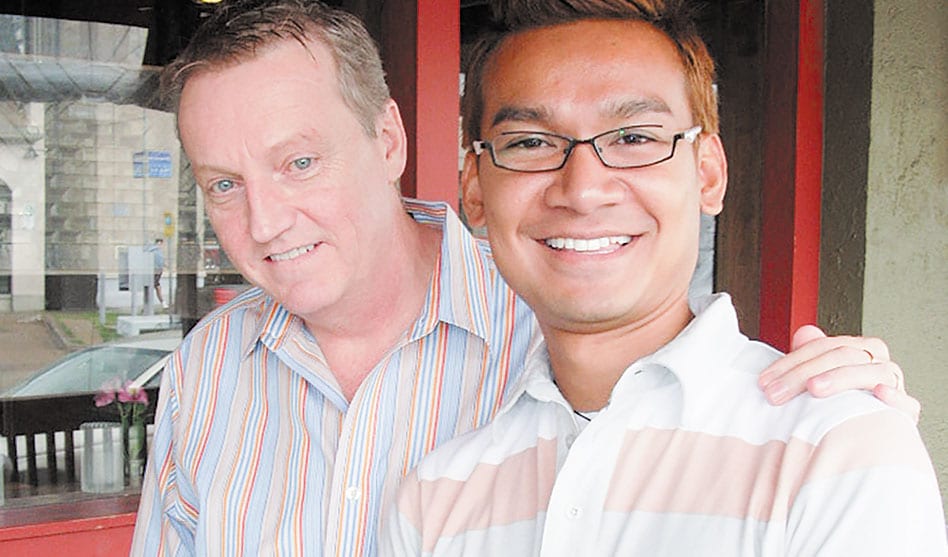Cannon Salleh-Flowers, left, and his husband RafiQ.
After 22 years together and a legal marriage, Cannon and RafiQ face questions from Homeland Security over the ‘validity’ of the relationship
DAVID TAFFET | Senior Staff Writer
taffet@dallasvoice.com
Cannon and RafiQ Salleh-Flowers have been together 22 years. After their January 2014 marriage in California, they applied for and received RafiQ’s temporary green card.
To support the application, they supplied a stack of documents measuring about a foot high to support their claim of a “good faith marriage.” That included their marriage license, photos, tax returns, insurance documents, joint bank accounts, joint investment accounts, wills and powers of attorney, leases and mortgages and drivers’ licenses. All of that showed that since they met in Singapore and then moved to the U.S., they have lived together and commingled all of their assets.
In December 2016, they applied for RafiQ’s permanent green card. Three weeks ago, the couple received a letter telling them they “have not established that the marriage upon which you were granted conditional status was entered into in good faith.”
Homeland Security acknowledges in its letter that tax returns, leases, utility statements and photos are indeed included, but they claim that doesn’t sufficiently establish they have “shared assets, liabilities, finances and/or property.”
Then a list of what would establish shared property begins with “children as a result of your marriage.”
Interesting that the government considers children to be property. And, unfortunately, both Cannon and RafiQ, since the time of their marriage, have been beyond their childbearing years.
Next on the list is “deeds and mortgages in both names showing joint ownership.” Their joint lease proves they did live together and also indicates there wasn’t a mortgage. They rent, and home ownership isn’t required for citizenship.
Had Homeland Security been simply checking that the marriage was still intact four years after issuing the temporary green card, they could have asked for joint income tax returns as updated proof. That wouldn’t have been possible to file before the 2013 Windsor v. U.S. decision, which invalidated the Defense of Marriage Act and allowed the federal government to recognize marriages performed in states where they had already been legalized.
Instead, Homeland Security wrote in bold letters, “GOOD FAITH MARRIAGE, INSUFFICIENT EVIDENCE” and asked for current federal and state returns, joint checking, savings or investment accounts, joint property, life or health insurance documents and loan or credit card account statements.
All of that has been supplied and the letter says that all of those documents provided don’t prove their marriage.
But now, somehow, providing those same documents again will prove it.
Jackie Yodashkin is a spokesperson for Immigration Equality, a national organization founded with the mission to end the ban on immigration for persons with HIV, to have sexual orientation and gender identity recognized for purposes of granting asylum and gaining marriage equality for immigration purposes.
All three of the organization’s original goals were met. The HIV ban ended in 2010. Asylum may be granted for people whose lives are in danger because of their sexual orientation or gender identity and the Obergefell decision granted the right for same-sex couples to marry in 2015.
Despite those victories, Yodashkin said her organization is busier than ever and is currently working with as many as 700 bi-national couples.
Although Homeland Security asked the Salleh-Flowers about having had children, Immigration Equality has cases in federal court concerning the government not recognizing the children of those who’ve been granted asylum. She said cases like Salleh-Flowers are just part of the current immigration problem that “shows animus toward immigrants.”
To underscore the problem of detentions currently underway, especially for LGBT people, she said a report released by the Center for American Progress last week showed that LGBT people are 97 times more likely to be sexually abused in detention than straight detainees.
Immigration Equality works with advocates for those seeking asylum so they understand the issues they’re dealing with. Unfortunately, immigration judges don’t get that same training.
Yodashkin gave a recent example of a transgender woman from Mexico denied asylum because parts of that country have marriage equality. That judge was confusing gender identity with sexual orientation.
In the same way, some people at Homeland Security may be misunderstanding same-sex marriage or imposing their own values rather than accepting as valid the same marriage license issued to any couple, she said.
“Our combined faith is strong,” Cannon said. “But, the trauma RafiQ and I suffer on a daily basis for the past 22 years is like a silent darkness in the room, always in the room, and you manage to hold on to each other to get through, making no long-term plans because you have no idea where you will be in the long term. We live from visa to visa, immigration status to immigration status, and the roadblocks can make us sad and often seem insurmountable. All of this because we are a same-sex, binational, human couple.”


